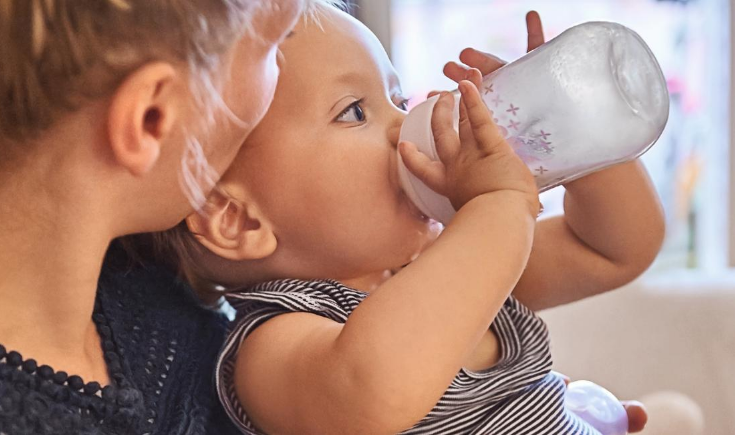

What is overfeeding?
Overfeeding a bottle fed baby is when your baby receives more food than needed for his/her growth and development. It’s more common in bottle fed babies because it can take less effort for an infant to drink from a bottle and the baby is not participating as actively during feeding. Also, mums can get concerned that their little ones are not having enough to eat if an entire bottle is not finished and so continue feeding until the last drop is gone. This can mean that babies get a little more than they need from time to time.
Like breastfeeding, bottle fed babies should be fed on demand. That is, they should eat when they are hungry and stop when they are full. Babies are very good at regulating the amount of food they need and unlike some adults, are not stimulated to eat in response to non-hunger cues like emotion or stress. So, it’s important to be aware of and respond to their cues of hunger and fullness. If all of this is going well, then it is likely that your baby is feeding well.
How do I know if my baby is full during a feed?
Babies can’t communicate with words to tell you when they are full but they can give cues during a feed to help mums understand when they’ve have had enough. Of course, every baby is different so learning the cues and body language your little one is delivering, will help guide you in knowing when they show signs of being full.
Some fullness cues include:
- Turns head away from bottle
- Pushing away the bottle
- Seals lips together
- Slow, decreased or stops sucking
- Distracted or pays attention to surroundings more
- Extended arms and legs
- Hands are open and relaxed
- Back arching
- Appears relaxed or drowsy
- Falling asleep
- Dribbling out of the corner of their mouth
What are the consequences of overfeeding?
Not only can overfeeding make your baby feel uncomfortable, ignoring their fullness cues will override their own ability to tell when they are hungry or full. This may have a detrimental effect as it can cause feeding and weight problems in later life. Even in the first few months, overfeeding with formula has been linked to childhood obesity.
How do I know if my baby is getting enough nutrition?
Many mums are concerned that their babies may not be getting enough formula. There are some easy ways to see whether or not your baby is getting enough milk, which include:
- Frequent nappy changes (approximately 6-8 wet nappies per day)
- Gaining sufficient weight
The best indication that your baby is receiving adequate nutrition is a thriving, active baby with good wakeful contentment during the day. Other good indicators include good skin tone with bright eyes.
Constantly overruling or denying your little ones fullness cues, may make them lose their ability to self-regulate their own appetite and may have detrimental effects later in life. Children need to be given the chance to experience, understand, and trust their own satiety and hunger cues. Your baby should not be restricted to a meal schedule. Instead, they need to be fed when they are hungry and not forced to continue eating after they show fullness cues.
This information provided by Accredited Practising Dietitan and Paediatric dietitian Shae Rickards – is of a general nature only and is not intended to replace advice from a medical professional. If you have any concerns about your health, or the health of your child, you should always consult a medical professional.























